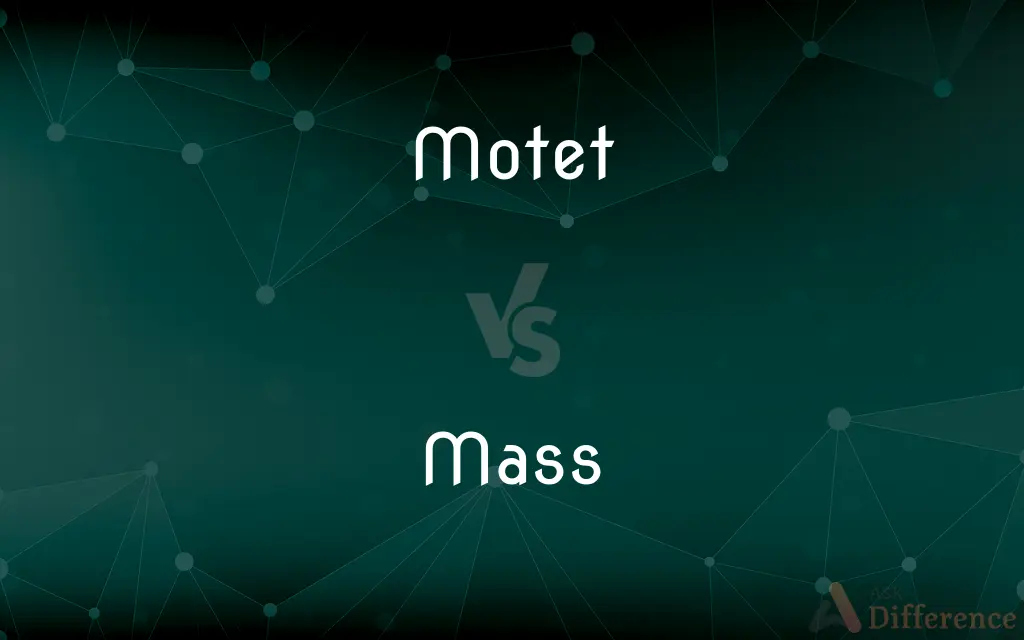Motet vs. Mass — What's the Difference?
By Urooj Arif & Fiza Rafique — Updated on March 11, 2024
A motet is a polyphonic, sacred Latin choral work, not mass text, emphasizing harmony. A Mass sets Eucharist texts to music, with a structured order.

Difference Between Motet and Mass
Table of Contents
ADVERTISEMENT
Key Differences
A motet, historically, is a piece of music written for a choir to perform without instrumental accompaniment, emphasizing complex vocal arrangements and harmonies. Whereas, a Mass is a liturgical music piece that accompanies the Catholic worship service, structured around five main parts: Kyrie, Gloria, Credo, Sanctus, and Agnus Dei, often including instrumental as well as vocal music.
Motets are characterized by their textural richness and contrapuntal style, meaning multiple vocal lines are interwoven to create a dense and intricate musical tapestry. On the other hand, Mass settings can range from simple chant melodies to elaborate polyphonic works, but they follow a specific sequence of liturgical texts.
The texts for motets can be derived from various sources, including the Bible, liturgical texts outside the Mass ordinary, or even non-liturgical texts, allowing for a wide thematic range. The Mass, however, adheres strictly to the liturgical texts prescribed for the Eucharist service, ensuring uniformity across different compositions and settings.
Motets were particularly popular from the Medieval period through the Renaissance and into the Baroque, serving both liturgical and ceremonial functions. Mass compositions have been central to Catholic worship since the early Church, evolving musically over centuries but maintaining their fundamental liturgical role.
While motets allow composers to explore a variety of texts and musical styles within a sacred context, Masses provide a framework within which composers express the depths of their musical invention while adhering to the texts of the Mass ordinary.
ADVERTISEMENT
Comparison Chart
Definition
A polyphonic choral composition on a sacred Latin text, not including the ordinary of the mass.
A musical composition setting the liturgical texts of the Eucharist to music.
Text Source
Sacred Latin texts, but varied and not limited to the Mass ordinary.
Fixed liturgical texts of the Mass ordinary.
Musical Style
Polyphonic, with emphasis on vocal harmony and complexity.
Can range from monophonic (chant) to polyphonic, with or without instrumental accompaniment.
Liturgical Function
Used in various liturgical services and devotional contexts, not restricted to the Mass.
Central to the Roman Catholic Mass and other liturgical traditions' Eucharist services.
Historical Period
Flourished from the Medieval period through the Renaissance and Baroque.
Has been a part of Christian liturgical practices since the early Church, evolving over time.
Compare with Definitions
Motet
Motets can serve both liturgical and ceremonial purposes.
Duruflé’s Ubi caritas is often performed during Maundy Thursday services.
Mass
The Mass has evolved musically from Gregorian chant to complex polyphony.
The Vatican II changes influenced the incorporation of vernacular languages.
Motet
A motet is a sacred choral composition with complex vocal arrangements.
Palestrina's Sicut cervus is a Renaissance motet known for its polyphonic beauty.
Mass
Mass settings can be elaborate, involving choirs, soloists, and orchestras.
Bach’s Mass in B minor is one of the most complex settings.
Motet
Motets are typically set to Latin texts outside the Mass ordinary.
Bach’s Jesu, meine Freude combines scriptural texts with chorale.
Mass
The Mass plays a central role in Catholic worship, with music enhancing the liturgical experience.
Gounod’s St. Cecilia Mass is celebrated for its lyrical beauty.
Motet
The musical structure of motets emphasizes counterpoint and harmony.
Byrd’s motets showcase intricate interplay between voice parts.
Mass
A Mass is a musical setting of the liturgy of the Eucharist.
Mozart's Requiem Mass in D minor is a renowned example.
Motet
Historically, motets were a capella, though instrumental accompaniments were later added.
Monteverdi included instrumental parts in some of his motets.
Mass
Mass compositions include sections like Kyrie, Gloria, Credo, Sanctus, and Agnus Dei.
Beethoven’s Missa Solemnis is structured around these parts.
Motet
In Western classical music, a motet is mainly a vocal musical composition, of highly diverse form and style, from the high medieval music to the present. The motet was one of the pre-eminent polyphonic forms of Renaissance music.
Mass
Mass is both a property of a physical body and a measure of its resistance to acceleration (rate of change of velocity with respect to time) when a net force is applied. An object's mass also determines the strength of its gravitational attraction to other bodies.
Motet
A polyphonic composition based on a sacred text and usually sung without accompaniment.
Mass
The celebration of the Christian Eucharist, especially in the Roman Catholic Church
We went to Mass
Motet
A composition adapted to sacred words in the elaborate polyphonic church style; an anthem.
Mass
Involving or affecting large numbers of people or things
A mass exodus of refugees
The film has mass appeal
Motet
A composition adapted to sacred words in the elaborate polyphonic church style; an anthem.
Mass
Assemble or cause to assemble into a single body or mass
Both countries began massing troops in the region
Clouds massed heavily on the horizon
Motet
An unaccompanied choral composition with sacred lyrics; intended to be sung as part of a church service; originated in the 13th century
Mass
Public celebration of the Eucharist in the Roman Catholic Church and some Protestant churches.
Mass
The sacrament of the Eucharist.
Mass
A musical setting of certain parts of the Mass, especially the Kyrie, Gloria, Credo, Sanctus, and Agnus Dei.
Mass
A unified body of matter with no specific shape
A mass of clay.
Mass
A grouping of individual parts or elements that compose a unified body of unspecified size or quantity
"Take mankind in mass, and for the most part, they seem a mob of unnecessary duplicates" (Herman Melville).
Mass
A large but nonspecific amount or number
A mass of bruises.
Mass
A lump or aggregate of coherent material
A cancerous mass.
Mass
The principal part; the majority
The mass of the continent.
Mass
The physical volume or bulk of a solid body.
Mass
Abbr. m(Physics) A property of matter equal to the measure of the amount of matter contained in or constituting a physical body that partly determines the body's resistance to changes in the speed or direction of its motion. The mass of an object is not dependent on gravity and therefore is different from but proportional to its weight.
Mass
An area of unified light, shade, or color in a painting.
Mass
(Pharmacology) A thick, pasty mixture containing drugs from which pills are formed.
Mass
Masses The body of common people or people of low socioeconomic status
"Give me your tired, your poor, / Your huddled masses yearning to breathe free" (Emma Lazarus).
Mass
To gather or be gathered into a mass.
Mass
Of, relating to, characteristic of, directed at, or attended by a large number of people
Mass education.
Mass communication.
Mass
Done or carried out on a large scale
Mass production.
Mass
Total; complete
The mass result is impressive.
Mass
(physical) Matter, material.
Mass
A quantity of matter cohering together so as to make one body, or an aggregation of particles or things which collectively make one body or quantity, usually of considerable size.
Mass
(obsolete) Precious metal, especially gold or silver.
Mass
(physics) The quantity of matter which a body contains, irrespective of its bulk or volume. It is one of four fundamental properties of matter. SI unit of mass: kilogram.
Mass
(pharmaceutical drug) A medicinal substance made into a cohesive, homogeneous lump, of consistency suitable for making pills; as, blue mass.
Mass
(medicine) A palpable or visible abnormal globular structure; a tumor.
Mass
(bodybuilding) Excess body weight, especially in the form of muscle hypertrophy.
Mass
(proscribed) weight
Mass
A large quantity; a sum.
Mass
Bulk; magnitude; body; size.
Mass
The principal part; the main body.
Mass
A large body of individuals, especially persons.
The mass of spectators didn't see the infraction on the field.
A mass of ships converged on the beaches of Dunkirk.
Mass
(in the plural) The lower classes of persons.
The masses are revolting.
Mass
(Christianity) The Eucharist, now especially in Roman Catholicism.
Mass
(Christianity) Celebration of the Eucharist.
Mass
The sacrament of the Eucharist.
Mass
A musical setting of parts of the mass.
Mass
(transitive) To form or collect into a mass; to form into a collective body; to bring together into masses; to assemble.
Mass
(intransitive) To assemble in a mass
Mass
To celebrate mass.
Mass
Involving a mass of things; concerning a large quantity or number.
There is evidence of mass extinctions in the distant past.
Mass
Involving a mass of people; of, for, or by the masses.
Mass unemployment resulted from the financial collapse.
Mass
The sacrifice in the sacrament of the Eucharist, or the consecration and oblation of the host.
Mass
The portions of the Mass usually set to music, considered as a musical composition; - namely, the Kyrie, the Gloria, the Credo, the Sanctus, and the Agnus Dei, besides sometimes an Offertory and the Benedictus.
Mass
A quantity of matter cohering together so as to make one body, or an aggregation of particles or things which collectively make one body or quantity, usually of considerable size; as, a mass of ore, metal, sand, or water.
If it were not for these principles, the bodies of the earth, planets, comets, sun, and all things in them, would grow cold and freeze, and become inactive masses.
A deep mass of continual sea is slower stirredTo rage.
Mass
A medicinal substance made into a cohesive, homogeneous lump, of consistency suitable for making pills; as, blue mass.
Mass
A large quantity; a sum.
All the mass of gold that comes into Spain.
He had spent a huge mass of treasure.
Mass
Bulk; magnitude; body; size.
This army of such mass and charge.
Mass
The principal part; the main body.
Night closed upon the pursuit, and aided the mass of the fugitives in their escape.
Mass
The quantity of matter which a body contains, irrespective of its bulk or volume.
Mass
To celebrate Mass.
Mass
To form or collect into a mass; to form into a collective body; to bring together into masses; to assemble.
But mass them together and they are terrible indeed.
Mass
The property of a body that causes it to have weight in a gravitational field
Mass
(often followed by `of') a large number or amount or extent;
A batch of letters
A deal of trouble
A lot of money
He made a mint on the stock market
It must have cost plenty
Mass
An ill-structured collection of similar things (objects or people)
Mass
(Roman Catholic Church and Protestant Churches) the celebration of the Eucharist
Mass
A body of matter without definite shape;
A huge ice mass
Mass
The common people generally;
Separate the warriors from the mass
Power to the people
Mass
The property of something that is great in magnitude;
It is cheaper to buy it in bulk
He received a mass of correspondence
The volume of exports
Mass
A musical setting for a Mass;
They played a Mass composed by Beethoven
Mass
A sequence of prayers constituting the Christian eucharistic rite;
The priest said Mass
Mass
Join together into a mass or collect or form a mass;
Crowds were massing outside the palace
Mass
Occurring widely (as to many people);
Mass destruction
Mass
Gathered or tending to gather into a mass or whole;
Aggregate expenses include expenses of all divisions combined for the entire year
The aggregated amount of indebtedness
Common Curiosities
What is a motet?
A motet is a polyphonic choral composition set to a sacred Latin text, distinct from the Mass ordinary, focusing on complex vocal harmony and counterpoint.
What distinguishes a Mass from other sacred music compositions?
A Mass is specifically a musical setting of the Catholic Eucharist liturgy, structured around five main parts: Kyrie, Gloria, Credo, Sanctus, and Agnus Dei.
Why are Masses important in Catholic worship?
Masses are central to Catholic worship as they musically frame the liturgy of the Eucharist, the most sacred part of Catholic ritual, enhancing the spiritual experience.
Can motets be part of a Mass service?
Yes, motets may be performed during a Mass service but are typically not part of the fixed liturgical sequence. They might be used as meditational or offertory pieces.
How do the texts of motets and Masses differ?
Motets use a variety of sacred Latin texts, sometimes biblical or non-liturgical, whereas Masses strictly adhere to the liturgical texts of the Mass ordinary.
How has the musical style of Masses evolved over time?
The musical style of Masses has evolved from simple Gregorian chant to complex polyphony and beyond, reflecting changes in musical taste and liturgical reforms.
Are motets always religious?
While traditionally sacred, motets, especially in later periods, can occasionally adopt non-religious texts but maintain a spiritual or contemplative character.
How do composers approach setting the Mass ordinary to music?
Composers approach the Mass ordinary with creativity within a framework, balancing musical innovation with adherence to the text's sacred significance.
What are the key musical elements of a motet?
Key elements include polyphony, complex vocal harmonies, and a capella performance, though instruments may sometimes accompany.
What is the significance of the Mass ordinary?
The Mass ordinary consists of texts that remain consistent across different Mass services, providing a stable framework for musical setting and liturgical practice.
How did the Council of Trent affect motet and Mass compositions?
The Council of Trent (1545-1563) called for clarity and doctrinal correctness in liturgical music, influencing the composition of both motets and Masses to be more focused on textual intelligibility and appropriate sacredness.
What role do choirs play in performing motets and Masses?
Choirs are central to the performance of motets and Masses, providing the vocal harmonies and textures that define these genres.
How do modern performances of motets and Masses differ from historical ones?
Modern performances may use contemporary instruments, mixed-gender choirs, and sometimes adapt the music to modern tastes, whereas historical performances were more likely to follow the composer's original specifications and performance practices.
Can non-Catholic composers write Masses?
Yes, composers of various religious backgrounds have written Mass settings, often as artistic expressions or for ceremonial use outside of strict liturgical contexts.
What are some famous motet composers?
Famous motet composers include Palestrina, Bach, and Byrd, known for their mastery of polyphony and sacred expression.
Share Your Discovery

Previous Comparison
Stubborn vs. Hardheaded
Next Comparison
Appetizer vs. StarterAuthor Spotlight
Written by
Urooj ArifUrooj is a skilled content writer at Ask Difference, known for her exceptional ability to simplify complex topics into engaging and informative content. With a passion for research and a flair for clear, concise writing, she consistently delivers articles that resonate with our diverse audience.
Co-written by
Fiza RafiqueFiza Rafique is a skilled content writer at AskDifference.com, where she meticulously refines and enhances written pieces. Drawing from her vast editorial expertise, Fiza ensures clarity, accuracy, and precision in every article. Passionate about language, she continually seeks to elevate the quality of content for readers worldwide.















































